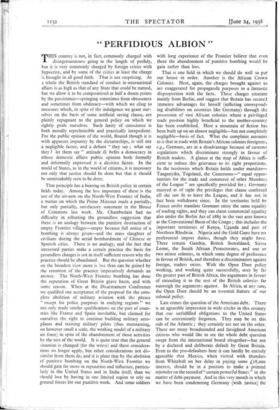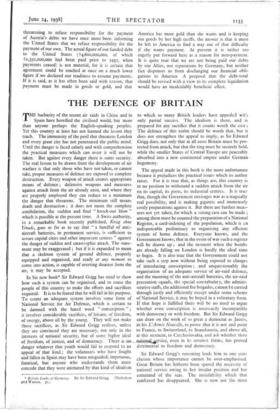" PERFIDIOUS ALBION "
THIS country is not, in fact, commonly charged with disingenuousness going to the length of perfidy, but it is very commonly charged by foreign critics with hypocrisy, and by some of the critics at least the charge is brought in all good faith. That is not surprising. As a whole the British standard of conduct in international affairs is as high as that of any State that could be named, but we allow it to be compromised at half a dozen points by the persistence—springing sometimes from obtuseness and sometimes from obduracy—with which we cling to measures which, in spite of the indulgence we grant our- selves on the basis of some artificial saving clause, are plainly repugnant to the general policy on which we rightly pride ourselves. Such laxity of conscience is both morally reprehensible and practically inexpedient. For the public opinion of the world, flouted though it is with apparent impunity by the dictatorships, is still not a negligible factor, and a defiant " they say ; what say they ? let them say " attitude ill befits a democracy in whose domestic affairs public opinion both formally and informally expressed is a decisive factor. In the world of States, as in the world of citizens, it is necessary not only that justice should be done but that it should be unmistakably seen to be done.
That principle has a bearing on British policy in certain fields today. Among the less important of these is the use of the air-arm on the North-West Frontier of India, a matter on which the Prime Minister made a partially, but only partially, satisfactory statement in the House of Commons last week. Mr. Chamberlain had no difficulty in rebutting the groundless suggestion that there is an analogy between the punitive destruction of empty Frontier villages—empty because full notice of a bombing is always given—and the mass slaughter of civilians during the aerial bombardment of Chinese or Spanish cities. There is no analogy, and the fact that interested parties make a certain practice the basis for groundless charges is not in itself sufficient reason why the practice should be abandoned. But the question whether on the broadest view more is lost than can be gained by the retention of the practice imperatively demands an answer. The North-West Frontier bombing has done the reputation of Great Britain grave harm, and with some reason. When at the Disarmament Conference we qualified our acceptance of the proposal for the com- plete abolition of military aviation with the phrase " except for police purposes in outlying regions " we not only made similar qualifications on the part of coun- tries like France and Spain inevitable, but claimed for ourselves the right to continue building military aero- planes and training military pilots (thus maintaining, on however small a scale, the working model of a military air force) in spite of the abandonment of those activities by the rest of the world. It is quite true that the general situation is changed (for the worse) and these considera- tions no longer apply, but other considerations not dis- similar from them do, and it is plain that by the abolition of punitive bombing on the North-West Frontier we should gain far more in reputation and influence, particu- larly in the United States and in India itself, than we should lose by having in one limited region to rely on ground forces for our punitive work. And some soldiers with long experience of the Frontier believe that even there the abandonment of punitive bombing would be gain rather than loss.
That is one field in which we should do well to put our house in order. Another is the African Crown Colonies. Here, again, the charges brought against us are exaggerated for propaganda purposes to a fantastic disproportion with the facts. These charges emanate mainly from Berlin, and suggest that Britain has secured immense advantages for herself (inflicting correspond- ing disabilities on countries like Germany) through the possession of vast African colonies where a privileged trade position highly beneficial to the mother-country has been established. Here a mountain of fiction has been built up on an almost negligible—but not completely negligible—basis of fact. What the complaint amounts to is that in trade with Britain's African colonies foreigners, e.g., Germans, are at a disadvantage because of customs regulations which discriminate strongly in favour of British traders. A glance at the map of Africa is suffi- cient to reduce this grievance to its right proportions. In the territories which Britain holds under mandate— Tanganyika, Togoland, the Cameroons—" equal oppor- tunities for the trade and commerce of other Members of the League " are specifically provided for ; Germany enjoyed as of right the privileges that clause conferred till she saw fit to leave the League, and it has not in fact been withdrawn since. In the territories held by France under mandate Germans enjoy the same equality of trading rights, and they can claim commercial equality also under the Berlin Act of 1885 in the vast area known as the Conventional Basin of the Congo ; this includes the important territories of Kenya, Uganda and part of Northern Rhodesia. Nigeria and the Gold Coast have no preferential import duties, though they might have. There remain Gambia, British Somaliland, Sierra Leone, the South African Protectorates, and one or two minor colonies, in which some degree of preference in favour of British, and therefore a discrimination against foreign, traders exists. With the Open Door policy working, and working quite successfully, over by far the greater part of British Africa, the arguments in favour of extending it to the rest of the British colonies far outweigh the arguments against. In Africa, at any rate, the Open Door should be an essential feature of our colonial policy.
Last comes the question of the American debt. There is an agreeable impression in wide circles in this country that our unfulfilled obligations to the United States can be conveniently forgotten. They may be on this side of the Atlantic ; they certainly are not on the other. There are many broadminded and farsighted American citizens who would like to see the whole debt question swept from the international board altogether—but not by a declared and deliberate default by Great Britain. Even to the pro-defaulters here it can hardly be entirely agreeable that Mexico, when visited with thunders from Whitehall on her delay in paying some £18,000 interest, should be in a position to make a pointed rejoinder on the record of" certain powerful States " in the matter of debt-payment. And in this very month in which we have been condemning Germany (with justice) for threatening to refuse responsibility for the payment of Austria's debts we have once more been informing the United States that we refuse responsibility for the payment of our own. The actual figure of our funded debt to the United States ($4,600,000,o0o, of which $1,351,000,000 had been paid prior to 1932, when payments ceased) is not material, for it is certain that agreement could be reached at once on a much lower figure if we declared our readiness to resume payments. If it is said, as it has often been said with reason, that payment must be made in goods or gold, and that America has more gold than she wants and is keeping out goods by her high tariffs, the answer is that it must be left to America to find a way out of that difficulty if she wants payment. At present it is rather too eagerly put forward here as a reason for non-payment. It is quite true that we are not being paid our debts by our Allies, nor reparations by Germany, but neither fact dispenses us from discharging our financial obli- gations to America. A proposal that the debt-total should be revised with a view to its complete liquidation would have an incalculably beneficial effect.















































 Previous page
Previous page